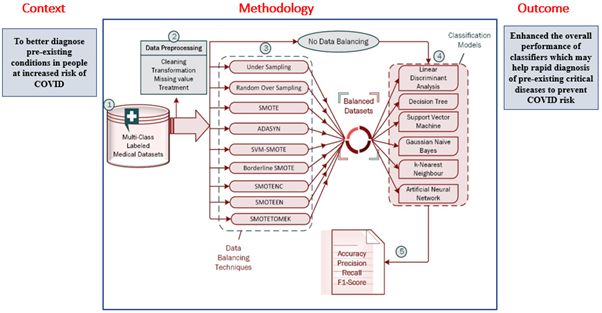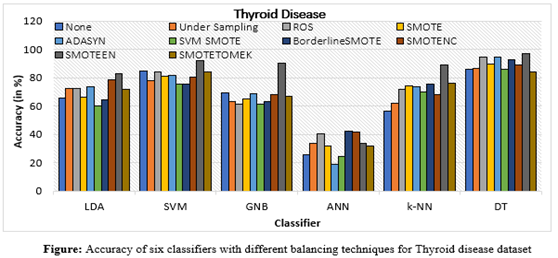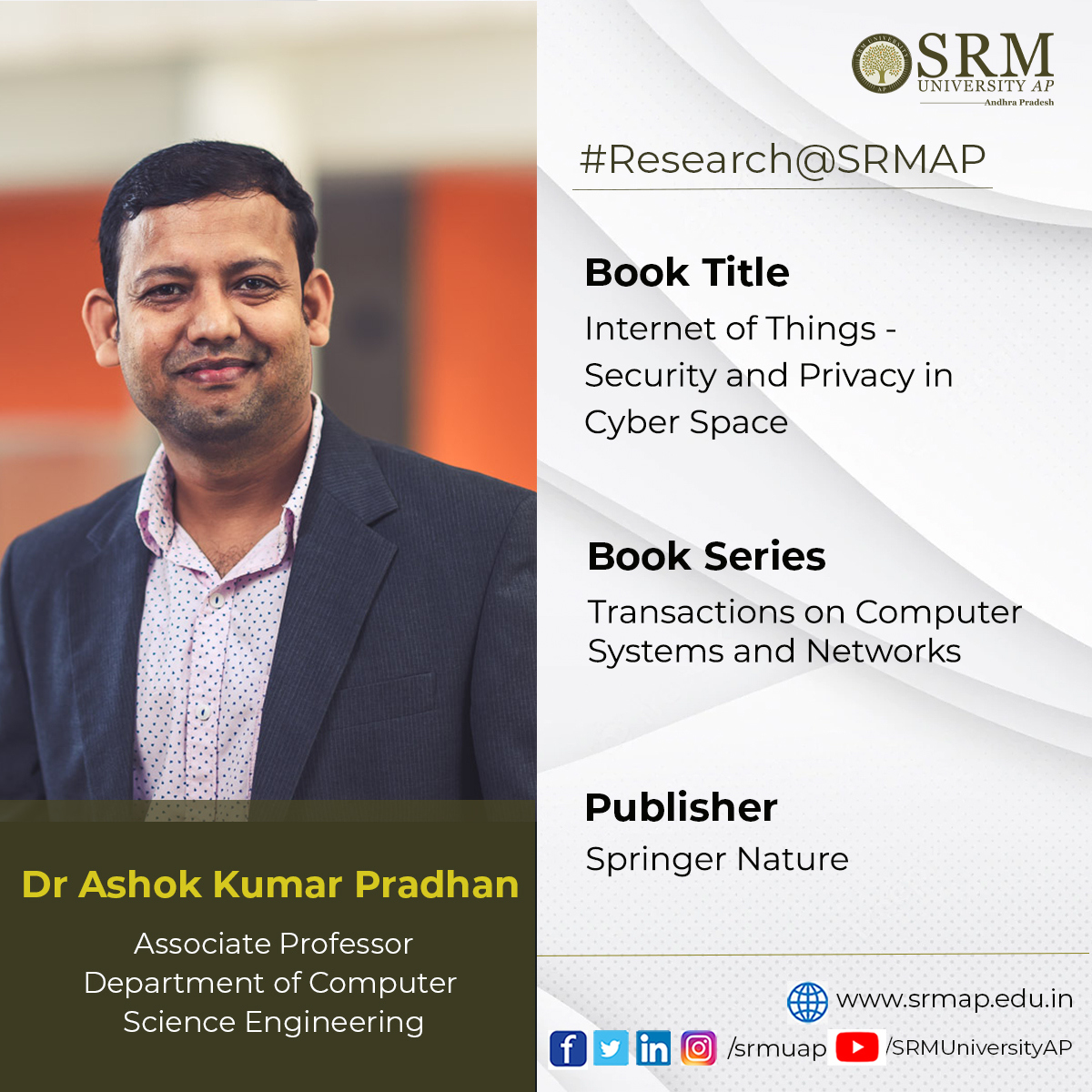Recent News
- Pre-existing health conditions and the risk of Covid-19 July 26, 2022
 Individuals with pre-existing medical conditions are more vulnerable to Covid-19 and its variants. Patients in countries like India require early testing to diagnose crucial disorders to reduce the risk. Research at the Department of Computer Science and Engineering has come up with a system that automatically identifies and categorises diseases based on the patient’s medical test results. Assistant Professor Dr Ravi Kant Kumar published a paper Improving Performance of Classifiers for Diagnosis of Critical Diseases to Prevent COVID Risk as a co-author in the Q1 journal Computers and Electrical Engineering and has an impact factor of 4.152. With an accurate diagnosis, the required actions can be planned and executed to stop the patients from serious health issues as well as covid risk.
Individuals with pre-existing medical conditions are more vulnerable to Covid-19 and its variants. Patients in countries like India require early testing to diagnose crucial disorders to reduce the risk. Research at the Department of Computer Science and Engineering has come up with a system that automatically identifies and categorises diseases based on the patient’s medical test results. Assistant Professor Dr Ravi Kant Kumar published a paper Improving Performance of Classifiers for Diagnosis of Critical Diseases to Prevent COVID Risk as a co-author in the Q1 journal Computers and Electrical Engineering and has an impact factor of 4.152. With an accurate diagnosis, the required actions can be planned and executed to stop the patients from serious health issues as well as covid risk.Abstract
The risk of developing COVID-19 and its variants may be higher in those with pre-existing health conditions such as thyroid disease, hepatitis C virus (HCV), breast tissue disease, chronic dermatitis, and other severe infections. As a result, early and precise identification of these disorders is critical. A huge number of patients in nations like India require early and rapid testing as a preventative measure. Machine learning methods for automatically identifying and classifying diseases have been created, and they function effectively when the dataset is well specified and balanced at every class level, including “no disease”. The problem of imbalance arises from the skewed nature of data, in which a large number of cases belonging to one class (known as the majority class) are classified correct, while the other class (known as the minority class) has lesser instances; is unfortunately misclassified by many classifiers. When it comes to human life, this kind of misclassification is unacceptable. To solve the misclassification issue and improve accuracy in such datasets, we applied a variety of data balancing techniques to several machine learning algorithms. The outcomes are encouraging, with a considerable increase in accuracy. As an outcome of these proper diagnoses, we can make plans and take the required actions to stop patients from acquiring serious health issues or viral infections.
Explanation of the research
 Lethal COVID-19 and its mutant forms may be more likely to arise in patients with pre-existing medical conditions such as thyroid illness, hepatitis C virus (HCV), breast tissue disease, chronic dermatitis, compromised immune systems, obesity, diabetes, heart disease, cancer, etc. For patients, an early and accurate diagnosis of these illnesses is crucial. Based on patient data, machine learning algorithms can assist in the early and quick detection of numerous diseases in a huge population like India. On the other side, machine learning algorithms perform poorly when a dataset has a class unbalanced problem. As a result, we used a variety of smote and its variants in this study to address the problems about the imbalanced class size. The experimental work showed that all six classifiers (DT, SVM, LDA, k-NN, GNB, and ANN) performed better overall on clinical datasets when class balancing strategies and classification techniques were combined. It recommends the use of the recommended classifications and class balancing technique with regard to specific data to identify the disease accurately and automatically
Lethal COVID-19 and its mutant forms may be more likely to arise in patients with pre-existing medical conditions such as thyroid illness, hepatitis C virus (HCV), breast tissue disease, chronic dermatitis, compromised immune systems, obesity, diabetes, heart disease, cancer, etc. For patients, an early and accurate diagnosis of these illnesses is crucial. Based on patient data, machine learning algorithms can assist in the early and quick detection of numerous diseases in a huge population like India. On the other side, machine learning algorithms perform poorly when a dataset has a class unbalanced problem. As a result, we used a variety of smote and its variants in this study to address the problems about the imbalanced class size. The experimental work showed that all six classifiers (DT, SVM, LDA, k-NN, GNB, and ANN) performed better overall on clinical datasets when class balancing strategies and classification techniques were combined. It recommends the use of the recommended classifications and class balancing technique with regard to specific data to identify the disease accurately and automaticallyFor this work, Dr Ravi Kant Kumar has collaborated with Mr Vinod Kumar, Koneru Lakshmaiah Education Foundation, Vaddeswaram,India, and Mr Gotam Singh Lalotra, University of Jammu, India. Their future research will investigate and design the most effective multi-class balancing method to address the multi-class imbalance problem in medical data.
Continue reading → - Internet of Things – Security and Privacy in Cyber Space July 13, 2022
 Transactions on Computer Systems and Networks is a unique series that aims to capture advances in the evolution of computer hardware and software systems and progress in computer networks. Associate Professor Dr Ashok Kumar Pradhan, Department of Computer Science and Engineering, becomes a part of this book series by publishing the book titled Internet of Things- Security and Privacy in Cyber Space. Edition 1 of the book was launched on May 27, 2022, under the publishing house Springer Nature. The series aims to present leading works on advances in theory, design, behaviour, and applications in computing systems and networks.
Transactions on Computer Systems and Networks is a unique series that aims to capture advances in the evolution of computer hardware and software systems and progress in computer networks. Associate Professor Dr Ashok Kumar Pradhan, Department of Computer Science and Engineering, becomes a part of this book series by publishing the book titled Internet of Things- Security and Privacy in Cyber Space. Edition 1 of the book was launched on May 27, 2022, under the publishing house Springer Nature. The series aims to present leading works on advances in theory, design, behaviour, and applications in computing systems and networks.This book covers major areas of device and data security and privacy related to the Internet of Things (IoT). It also provides an overview of lightweight protocols and cryptographic mechanisms to achieve security and privacy in IoT applications. Besides, the book also discusses intrusion detection and firewall mechanisms for IoT. It also covers topics related to embedded security mechanisms and presents suitable malware detection techniques for IoT. The book also contains a unique presentation on heterogeneous device and data management in IoT applications and showcases the major communication-level attacks and defense mechanisms related to IoT.
The book is beneficial for the students who pursue under graduation, post-graduation, and PhD as a reference to get the fundamental as well as research ideas about IoT/ cyber security/ Blockchain technology and their application areas.
Continue reading →

